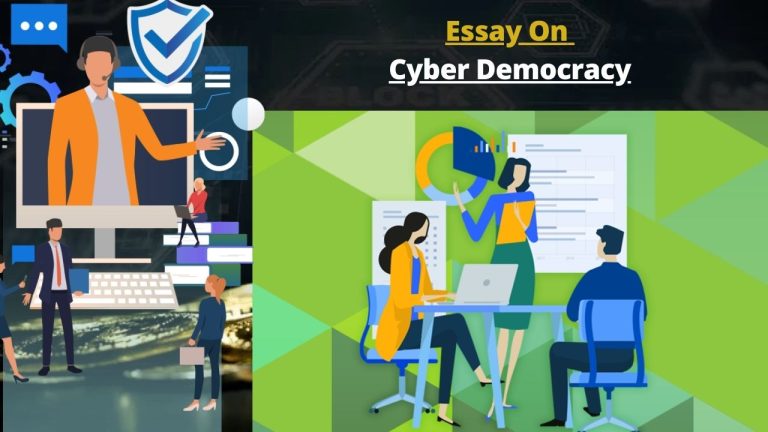"Advertisement"
Essay On Cyber Democracy
Hello My Dear Friend, In this post “Essay On Cyber Democracy” We will be going to read about Cyber Democracy as an Essay in detail. So…
Let’s Start…
Essay On Cyber Democracy
Introduction
Technology has revolutionized the way societies function, especially the political landscape, in today’s increasingly interconnected world.
Because of the growth of cyberspace, a new type of democracy called cyber democracy has emerged.
This essay examines the concept of cyber democracy, its benefits, and drawbacks, as well as its potential to change the way citizens participate in governance and exercise their rights.
I. Definition and Principles of Cyber Democracy
Cyber democracy is a governance system that uses digital technologies to improve citizen participation, transparency, and accountability.
Its goal is to encourage inclusivity, open debate, and equal representation in decision-making processes. Its guiding concepts are as follows:
1. Access to Information:
The Internet offers citizens a wealth of knowledge, allowing them to make informed decisions and participate in political debates.
2. E-participation:
Through digital channels such as social media, online forums, and e-voting, citizens can actively participate in the political process.
3. Transparency and Accountability:
Online platforms make it easier to disseminate government information while also maintaining openness and making elected officials responsible for their activities.
II. The Benefits of Cyber Democracy
1. Increased Civic Participation:
Citizen participation in cyber democracy is broader and more diverse. Individuals can use online platforms to voice their thoughts, participate in political debates, and contribute to policy discussions regardless of their physical location.
2. Availability and Inclusion:
Traditional hurdles to participation, such as geographical distance, physical limitations, and time limits, are no longer an issue in the digital realm.
It empowers marginalized communities while also ensuring that their voices are heard and promoting a more inclusive democracy.
3. Real-Time Feedback:
Citizens can provide rapid feedback on policies, express concerns, and hold politicians accountable using social media and internet platforms. This steady flow of information makes responsive government possible.
4. Direct Channels of Communication:
Cyber democracy enables a direct connection between citizens and government officials by removing the need for middlemen. This enables elected leaders to better understand and respond to the demands of their citizens.
III. Difficulties and Concerns
1. The Digital Divide
The digital divide, defined by unequal access to technology, is a significant threat to cyber democracy.
Socioeconomic differences, insufficient infrastructure, and a lack of digital literacy can all marginalize specific groups, maintaining existing power imbalances.
2. Deception and Fake News:
The internet has also become a fertile ground for misinformation and fake news, which can jeopardize democratic processes.
To combat disinformation, critical thinking skills, media literacy, and effective fact-checking systems are required.
3. Data Privacy and Security:
The collecting and storage of massive volumes of personal data are essential to cyber democracy. It is critical to protect data privacy and security in order to avoid unauthorized access and manipulation.
4. Cyberbullying and Polarisation:
Cyberspace’s anonymity and ease of communication can lead to online abuse, hate speech, and the formation of echo chambers. These challenges must be addressed in order to sustain a healthy and constructive digital public realm.
IV. Cyber Democracy’s Future
Cyber democracy’s promise remains great, but its success is dependent on overcoming the hurdles it faces.
Governments, civil society organizations, and technology corporations must work together on numerous fronts to develop a strong cyber democracy:
1. Closing the Digital Divide:
Efforts should be undertaken to increase internet access, develop digital literacy, and provide the infrastructure required to ensure fair participation.
2. Improving Digital Literacy:
Educational institutions should prioritize teaching critical thinking skills, media literacy, and responsible online behavior in order to provide citizens with the tools they need to properly traverse the digital domain.
3. Regulating Online Spaces:
Stricter restrictions should be implemented to prevent disinformation, hate speech, and online harassment while protecting free expression.
4. Improving Data Protection:
Governments should pass strong data protection legislation to protect citizens’ privacy rights and establish strict data management and storage norms.
Conclusion
In the internet age, cyber democracy has enormous potential to improve citizen engagement, openness, and accountability.
It enables greater civic participation, inclusivity, and real-time feedback. It does, however, provide issues such as the digital divide, misinformation, privacy concerns, and online harassment.
Overcoming these difficulties will necessitate a collaborative effort involving governments, civil society organizations, and technological corporations.
By resolving these difficulties and capitalizing on the opportunities, cyber democracy has the potential to revolutionize how citizens exercise their rights and contribute to governance in the twenty-first century.
Finally, Thanks For Reading “Essay On Cyber Democracy“.
If you have any questions related to “Essay On Cyber Democracy“, So, please comment below.
Must Read:
